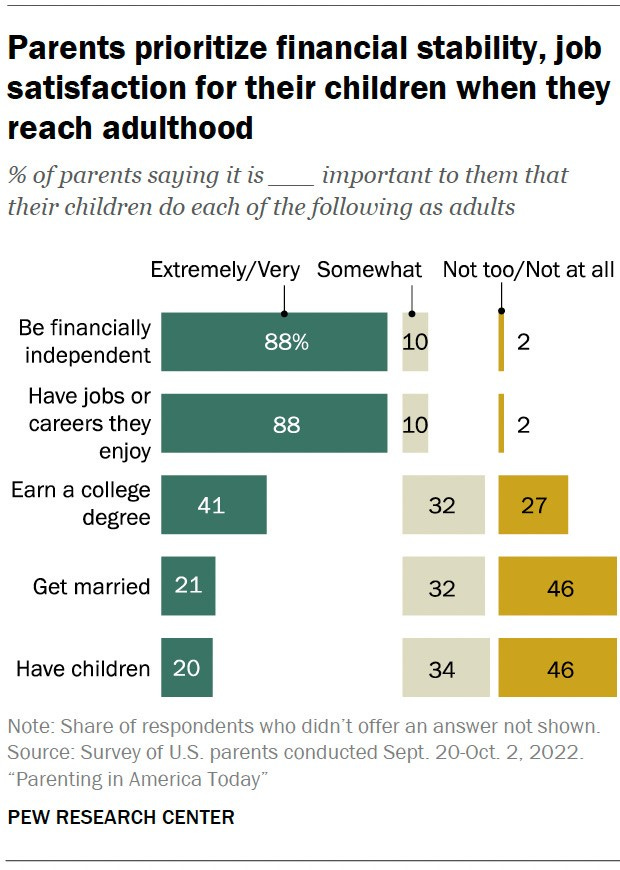The Good Portion: A Warning to Parents
Or: How To Guarantee an Anxiety Disorder before Sixteen!
I remember the first mentally ill child I encountered in my medical training. She was fifteen, polite, athletic, and very bright. Despite already being on anxiety medication for some time, she continued to feel stressed out; this was affecting her sleep and making it hard to function at her best. She needed to be at her best: on a typical day, as she and her parents explained, she’d wake up before five a.m. for team practice, then make it to school for her various Advanced Placement classes, then after school it was a sports game or debate competition or piano lesson, then hours of homework and PSAT prep, then bed. To be precise, lying awake in bed thinking worried thoughts and not sleeping.
Well, this is an easy one, I remember thinking (it was early in my medical education, I was still naïve). In this case, I had a non-speaking role – I was “shadowing,” a fly on the wall, with a renowned specialist in adolescent medicine. I expected this experienced professor and the patient’s parents to stage an intervention of sorts, to explain to this overwhelmed child that it was clearly time to cut back on some of her commitments, maybe have a sleepover or two, stop worrying so much about her resumé.
Was I ever wrong. The proud parents wanted nothing but a higher dose of medication to help her keep up with her schedule. The doctor agreed and gave them the prescription they wanted. I asked him about it afterwards, and his reply was along the lines of, “well, that’s what life is like for high-achieving teens these days, the family is doing what it takes to help her succeed.”
I don’t know how her story turned out; my guess is she got into a “good” college (do these still exist?), is excelling professionally - and is on an even higher dose of psychiatric medication. Almost ten years later, I see a patient that reminds me of her once a month or so.
What prompts this reminiscence? Perhaps you saw the latest Pew study on “Parenting in America Today.” The viral takeaway was this graph:
A chart to make a pharmaceutical executive weep – with joy.
Let’s visit with another overwhelmed woman, in a case described by the physician Luke:
Now as they went on their way, Jesus entered a village. And a woman named Martha welcomed him into her house. And she had a sister called Mary, who sat at the Lord's feet and listened to his teaching. But Martha was distracted with much serving. And she went up to him and said, “Lord, do you not care that my sister has left me to serve alone? Tell her then to help me.” But the Lord answered her, “Martha, Martha, you are anxious and troubled about many things. Here, have a Valium.”
No, excuse me, that can’t be right. Hold on a sec, I was using the BPV (Big Pharma Version). Let’s try the ESV:
But the Lord answered her, “Martha, Martha, you are anxious and troubled about many things, but one thing is necessary. Mary has chosen the good portion, which will not be taken away from her.”
God isn’t telling us to leave the dishes unwashed, the bed unmade, the dinner unserved. He is telling us to get our priorities in order – that the eternal takes precedence over the temporary. Your chores can wait, your salvation can’t.
Jesus had to teach us this lesson for a reason. We are daily prone to forget the eternal and get bogged down in the mundane muck of life. Distracted from distraction by distraction, as Eliot put it. Your kids don’t need you to do that for them, they will do a great job of doing it themselves! Parents should be the ones reminding kids about what truly matters, not piling the distractions on.
Sometimes God’s truth shines so bright it penetrates even to Harvard. Here, from one of the longest research studies ever conducted, is the key: “If you want to make one decision to ensure your own health and happiness, it should be to cultivate warm relationships of all kinds.” “Contrary to what many people might think,” the researchers add, the crucial part of lifelong happiness is “not career achievement.” They come up with hilarious evolutionary biology justifications (“Fifty thousand years ago, being alone was dangerous, and an isolated person’s body and brain would have gone into temporary survival mode” – yes, you really need an Ivy League degree to think like this), but even the secular takeaway is clear: whom you marry is more important than where you matriculate or how much you make. No matter how high you rise on the worldly ladder, there will always be another rung – a bigger raise, a bigger office, a bigger house – and the anxiety of such a life will never cease until you get your priorities right.
All of which is to say, if you are telling your children that their future raise matters more than whom they will raise, you are doing it wrong – and you’re guaranteeing a windfall for Pfizer and friends.
In The Federalist last year, I argued that by changing the nature of kindergarten, we were creating mental illness in children. Of course a child, who is meant to be singing and playing, will need pharmaceutical help to keep from fidgeting if he’s now expected to sit still completing worksheets. Similarly, of course a teenager will need to be drugged if her life is consumed with college applications instead of the good, the true, and the beautiful.
Have you ever seen one of those poor, depressed animals in the zoo? You know, the tiger with his fur falling out in clumps, pacing back and forth on a worn path, hour after hour, day after day? Chances are he’s not a born neurotic. It’s just that he’s a tiger in name only. He is a tiger only to the extent that he lives in a cage marked “tiger.” But there is no tigerness to his existence. Pacing back and forth in some small enclosure downtown, a couple blocks from the baseball stadium, he is as far removed from burning bright in the forests of the night as it is literally and metaphysically possible to be.
In the same way, if you take a six year old, put her in a cage all day, and label it “child,” she becomes a child in name only. The way to save her from the inevitable breakdown such an imprisonment would cause is to make her truly a child again – that is, to let her have a childhood. What we have more and more in this country, as evinced in that disastrous poll above, is children without childhoods – and that is why our pharma execs have never been happier.
Let me close with one final warning. Let us say that you do succeed in your quest to get Flossy into Columbia, even at the cost of her soul. Let us further say that, by a miraculous stroke, she ends up in one of those rare college classes that still teach what is worth learning. What is she liable to discover? Perhaps the class will read EM Forster’s classic, Howards End, with its memorable message attacking worldly greed and imploring people to, per that Harvard study above, “only connect.” Perhaps she will encounter Dickens, or Shakespeare, or any other number of classics with similar themes – it would be hard to imagine otherwise, as there isn’t exactly an extensive body of classic literature out there encouraging readers to forsake eternal truths for a corner office. The end result? Her soul may still be saved, and she will, thanks to the college you pressured her to get into, realize what painfully petty, materialistic parents you were! Just a thought…
Of course, you don’t even need to turn to the literary giants to learn the importance of important things. It’s hard to think of a Christmas movie, classic or modern, that doesn’t encourage its audience to spend less time at the office and more with their kids (it doesn’t even have to be a Christmas movie, as your cable provider will likely prove on Groundhog Day this week…). It’s hard to think of a popular song that implores you to stand up your date and work late tonight. I’m sure you can think of some of your favorite examples, please feel free to leave them in the comments. Let’s close with one you may not know, a deep cut from the highly underrated Jo Stafford:
It's As Simple As That - YouTube
Have a wonderful week, pray that God will help you raise children to follow His path and choose the good portion, and remember: “Be anxious for nothing, but in everything by prayer and supplication, with thanksgiving, let your requests be made known to God; and the peace of God, which surpasses all understanding, will guard your hearts and minds through Christ Jesus.”




While I do agree with the premise of this article, I read the results of the Pew Study a different way. I saw financially independent not as wealthy, but as having independence and autonomy because they are not relying on mom and dad to pay their bills. I also read having a career that they enjoy as finding meaning in work, not necessarily striving for the corner office. I think that is what we really want for our children - for them to be fulfilled, independent adults. It took me a while to let my older child get off the "success track" that so many of his peers are locked onto. His trajectory looks nothing like we would have ever expected but: 1) It is his path 2) He is making mistakes but learning from them 3) He is happy. My younger child is now applying to colleges and where she goes is 100% up to her. She is looking for fit and a true free-speech environment, and somewhere that is not home.
One more thought on anxiety in children. Yes, pressure and social media play a huge part but I have also come to believe that the constant focus on what makes us different (ie identity) is driving some of this. We have lost a sense of community, what we have in common and what our shared goals are. Volunteering and/or getting a job could go a long way to helping some of these children. They would make money (financial independence), interact with other people face to face (less screen time), and learn how to put the needs of others before their own.
Sadly, many of the parents of such surveys are much too smart to be reading such articles on SubStack, if they even know about SubStack's writers. At 82 with many proud accomplishments in life, my best is with my children who are doing OK as are the grands. They will never be rich in money terms but will be happy. And happy without any help from pHarma. I do regret that I was always working a bit too much when the children were young but do take solace that they have done well despite my neglect. OTOH, they were never pushed into anything; well maybe a bit of forced realism at times.